Guest speaker: Austin!¶

The world is facing an energy crisis [1], and new materials are certainly going to be a part of the solution. That’s one of the reasons why we choose to focus on dielectric materials in this module, as they are integral components in energy storage devices and microelectronics. As we increase renewable energy output, however, we must also develop new technology to store and move this energy—and that calls for, in addition to dielectric capacitors, better batteries. 🔋 Batteries are a hot technology (see Prof. Kristin Persson’s and Prof. Gerd Ceder’s work in UCB MSE for examples) that are also tough to understand given their reactive kinetics and multiscale characteristics. This means traditional batteries R&D is incredibly slow and faces a lot of the challenges that we’ve previously discussed that plague materials design and development. 🐌
To help address this need, Austin co-founded the battery informatics startup Aionics to leverage the power of AI to improve the performance, cost, and safety of batteries. This is based off of the research he did during his Ph.D. in Applied Physics at Stanford University working with Prof. Evan Reed and Prof. Yi Cui. He developed ML models to screen compounds from MP that could be promising candidates for solid Li-ion electrolytes [2,3]. Austin proudly hails from Yreka in Siskiyou County, CA and he obtained his BS in Applied Physics from UC Davis. His Twitter handle is @BatteryCowboy. 🤠
References¶
- 1
Steven J. Davis, Nathan S. Lewis, Matthew Shaner, Sonia Aggarwal, Doug Arent, Inês L. Azevedo, Sally M. Benson, Thomas Bradley, Jack Brouwer, Yet-Ming Chiang, Christopher T. M. Clack, Armond Cohen, Stephen Doig, Jae Edmonds, Paul Fennell, Christopher B. Field, Bryan Hannegan, Bri-Mathias Hodge, Martin I. Hoffert, Eric Ingersoll, Paulina Jaramillo, Klaus S. Lackner, Katharine J. Mach, Michael Mastrandrea, Joan Ogden, Per F. Peterson, Daniel L. Sanchez, Daniel Sperling, Joseph Stagner, Jessika E. Trancik, Chi-Jen Yang, and Ken Caldeira. Net-zero emissions energy systems. Science, 2018. doi:10.1126/science.aas9793.
- 2
Austin D. Sendek, Qian Yang, Ekin D. Cubuk, Karel-Alexander N. Duerloo, Yi Cui, and Evan J. Reed. Holistic computational structure screening of more than 12000 candidates for solid lithium-ion conductor materials. Energy & Environmental Science, 10(1):306–320, 2017. doi:10.1039/C6EE02697D.
- 3
Austin D. Sendek, Evan R. Antoniuk, Ekin D. Cubuk, Brandi Ransom, Brian E. Francisco, Josh Buettner-Garrett, Yi Cui, and Evan J. Reed. Combining superionic conduction and favorable decomposition products in the crystalline lithium–boron–sulfur system: A new mechanism for stabilizing solid Li-ion electrolytes. ACS Applied Materials & Interfaces, 12(34):37957–37966, 2020. doi:10.1021/acsami.9b19091.
